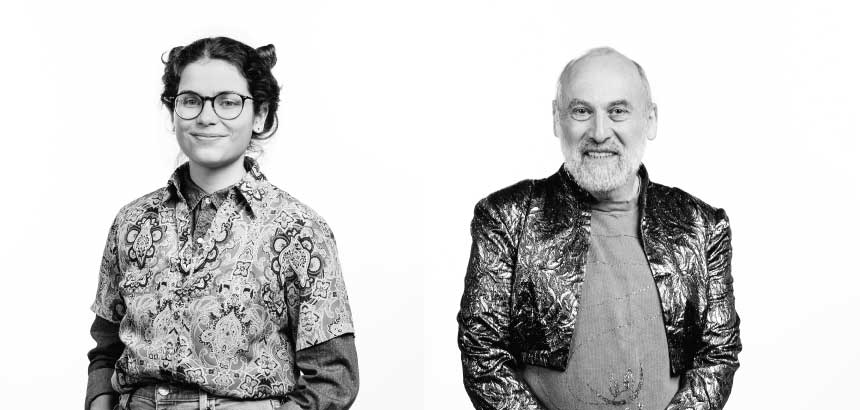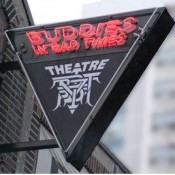Since September, we have been working with an incredible intergenerational group to create The Youth/Elders Project – a space where identities, personal histories and queer perspectives get turned into performance. As we get closer to our Mainstage performance later this month, some of the participants will be taking over our blog to talk about the journey to here. First up, Genady Gavelshov and Bella Larsen.
Bella: The first phase of the project consisted of weekly drop-in workshops where the youth and the elders were often segregated. How did you feel about meeting a younger generation of queer people?
Genady: I hardly pay attention to age. I just take everyone for who they are, regardless of whether they are a youth or an elder.
B: Have the youth taught you anything?
G: I am still learning how to communicate. We live in totally different worlds. The youth are not exactly gay.
B: How do you mean?
G: There are three older gay men in the project. Most of you identify as queer. That’s actually something I’ve learned. I now see the difference between gay and queer.
B: What’s the difference?
G: Queer means not straight. Anything that is not according to the rules is queer. What does queer mean for you?
B: I think the word queer, and a lot of other words in the LGBT vocabulary, are forever evolving and changing. Gender and sexuality are both so fluid. They can change and grow, so I suppose for me queer is a word that encompasses all of those changes and growths.
G: Where did you get the idea that you are queer?
B: My sexual identity has never really been fixed. I knew I was gay when I was fourteen and still in middle school. I had begun slowly piecing together little bits of information that might allude to the fact that I wasn’t straight. An obvious hint for me was that I was never interested in boys the way that my friends were, but a big giveaway was that I really took to gay culture. I took a particular interest in Degrassi, which I loved because I related so much to the queer characters. It was the first time that I was seeing myself in a storyline on TV.
My best friend in middle school played a lesbian in the school play. As I was watching the play, something clicked and I realized that I was in love with my best friend. I was so confused and terrified because I was having this giant epiphany, and it felt like my life story was being explained to me in the span of a play. I didn’t want to come out to myself, let alone other people. At the time, it was easier for me to accept bisexuality and have one foot still in the door of the heterosexual realm than it was to commit to what felt like a whole new lifestyle.
G: When I was fourteen, there were no TV series or anything that mentioned anything gay. Homosexuality was only mentioned in medicine books. I got no information at all!
B: I know! That’s one of the huge things that I’ve found has separated the youth and the elders. We had Degrassi to watch, Lady Gaga to listen to. We have all these people in the media telling us that it’s okay to be ourselves. It really dawned on me when I met the elders that you had no one when you were growing up. You maybe had a friend or a cousin who had a tip on how to survive as a gay person in a straight world, but other than that, nothing.
G: Yes, we were very much on our own.
B: What do you think has been the hardest part of the project for you?
G: It’s been difficult to pull stories about myself that I might want to use. I live under the impression that nothing interesting ever happens to me. That might not be true, but that’s how I feel.
B: You moved to Israel when you were nineteen, which is how old I am now. If you could tell your nineteen-year-old self something, what would it be?
G: I wouldn’t say I like my nineteen-year-old self. It wasn’t easy for me to assimilate. It was a totally different culture, especially in Israel.
B: How was life pre-Israel, when you were in the Soviet Union?
G: There were no organizations of any kind, just government funds. Obviously, there were no gay publications. The only way to meet another gay person was by chance.
B: From September to now, what’s been the biggest personal change for you?
G: There was something very special about meeting older people who were closeted for a long time in the harsh conditions here. I’ve gotten more communication with people. I have a few friends here, with whom I’ve established something, but the more people I’m exposed to, the more I learn to respect. The process has also inspired me to write stories, which is something I never did before.
B: That’s amazing!
G: What have you learned from the elders?
B: Not to take things for granted. There was this one session in November where the group was having a discussion about activism, and an elder asked, “Did I fight for nothing?” That made me cry! I realized much you guys have done to pave the way for younger generations. A lot of the elders I met throughout the series have lost loved ones, gone on marches, and fought for the rights that we have today. Your generation fought so many battles to make life easier for future generations to live as queer people. I am a young queer person. Since that session in the fall, I’ve been asking myself, “What am I doing? What can I do for even younger generations?” Things have progressed, but we’re nowhere close to perfect. I’ve learned that there’s always a little more fighting that needs to be done.
The Youth/Elders Project closes our 2016/17 Season with a limited run of performances May 31-June 4, 2017 – click here for more information.
photo by Tanja-Tiziana


